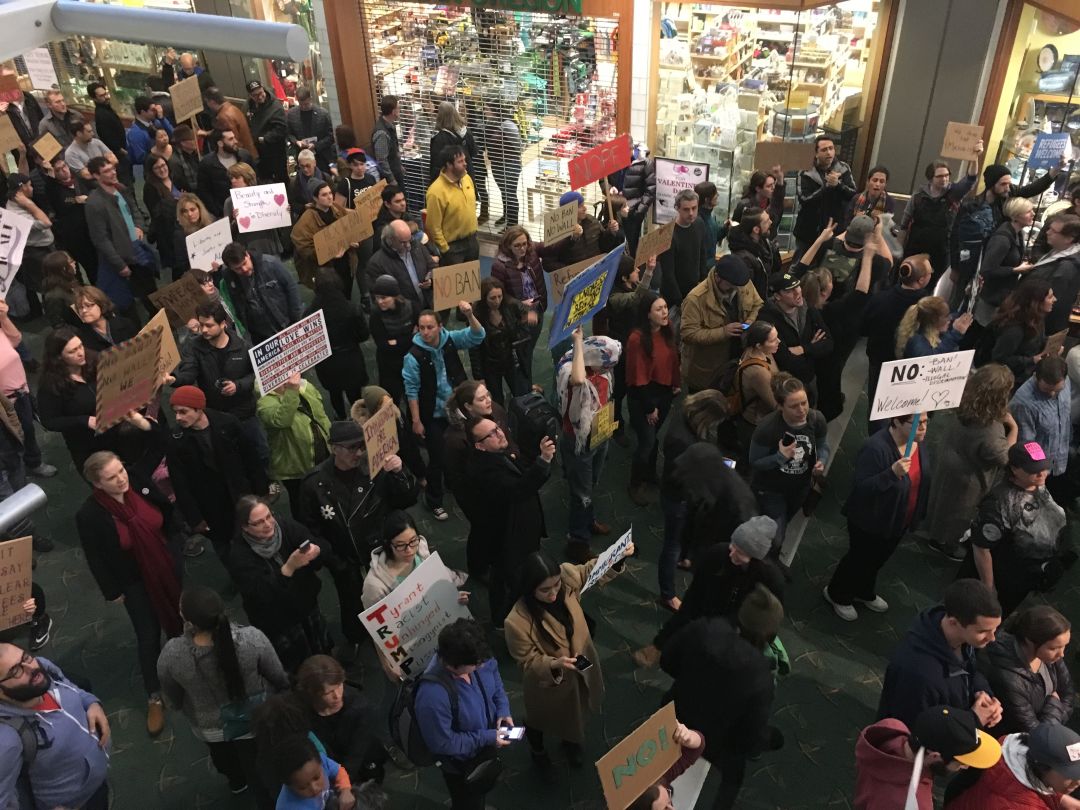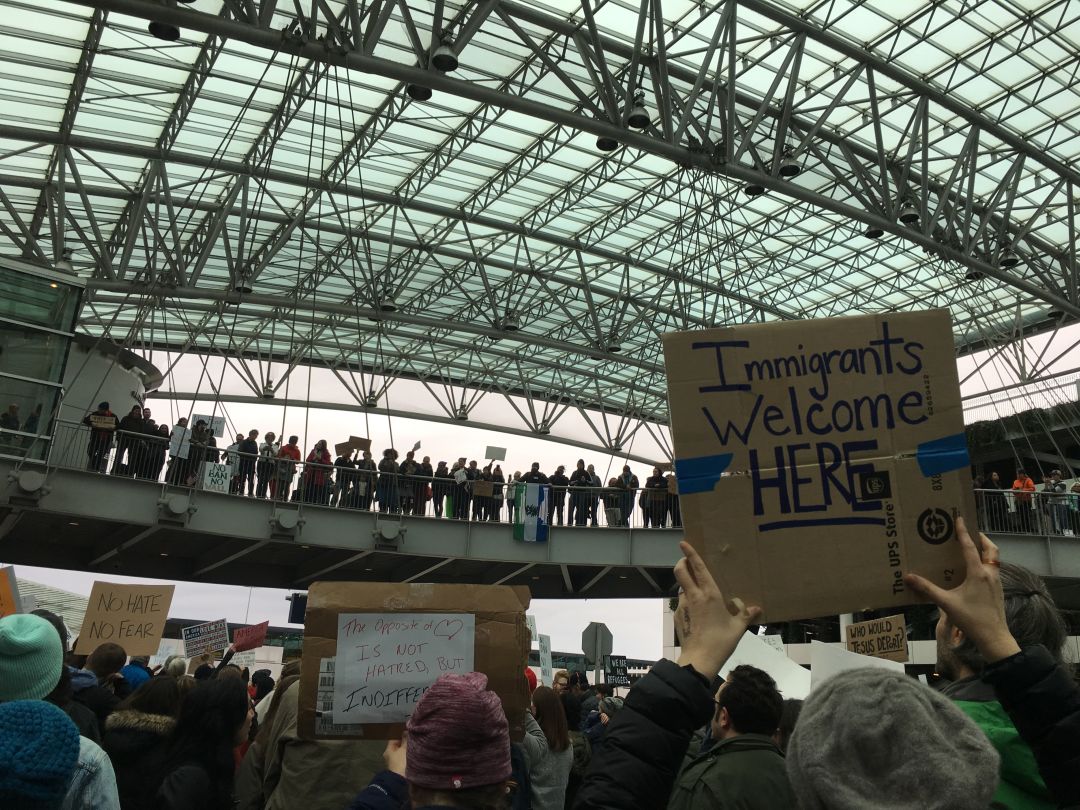How Trump's Travel Ban Affects Two PSU Students

Protesters swarm the Portland airport as news spreads of President Trump's executive order banning all refugees and, for 90 days, immigrant travel for residents of seven nations.
Image: Fiona McCann
While hundreds gathered at the Portland Airport last weekend to protest President Trump’s travel ban, Portland resident Moe was on the phone with his Rose City-bound sister in Denver.
“They took my visa, my green card,” she texted from behind the customs screening area, juggling her baby and hiding her actions from hovering Homeland Security agents. “They wanted to take my phone.”
Moe (not his real name) and his sister are Syrian: both subject, overnight, to President Donald Trump’s surprise January 27 order halting refugee intake and travel to the US for citizens of seven nations. Many news outlets since have reported on local consequences resulting from the order, including the heartbreaking story of an Iranian infant scheduled to receive care at OHSU.
Add to the list the 64 students from Iraq, Iran, Syria, Yemen, and Libya currently enrolled for Portland State University’s winter 2017 term. Most, says Margaret Everett, PSU’s Vice Provost for International Affairs, are graduate students sponsored by their own countries, “here to learn how to build bridges and roads, mitigate environmental impacts, and rebuild their communities.” Some, like Moe—who graduated from PSU’s business school last year—earned a green card to stay on in Portland. Moe puts his new accounting degree to work assisting current PSU students with their financial dilemmas.

PDX's departure lanes were cleared to make room for protesters.
Image: Fiona McCann
Last week, Moe’s future was wide open: he was engaged, and hoping to secure a permanent visa for his Syrian fiancé; his mother, back in Damascus, had just weeks earlier received an immigration visa after two years of waiting. His sister, like Moe a green card holder, had established her family here. Moe hoped to soon start his own in Portland as well, in a city of welcoming people who, he says, haven’t once directed a racist word his way.
Instead, Moe was now confronted with the imminent possibility that his sister and her child could now be deported, in turn forcing her husband back to war-torn Syria.
Moe sprung into action. Somehow, he got through to the office of Senator Jeff Merkley, who promised to help. The Senator put him in touch with several human rights groups, who immediately mobilized lawyers to help Moe’s sister. Within a few hours, she was on her way back to Portland. Now, says Moe, the problem is an uncertain future: not knowing whether his mother will be able to join them after the ban’s 90-day freeze for immigrants, and whether his wedding plans, without hope of a partnership visa, are suddenly at risk.
“The law says, these are immigrants’ benefits, and the ban is not allowing that," he says. "It changes our life. If I can’t bring my mom and my wife, I will leave the country. I will go to Syria, with its war and all of that, because it is the only country that will have me.”
Vice Provost Everett says the executive order has left her and her colleagues deeply dismayed. On Saturday, January 28, PSU President Wim Wiewel issued a statement decrying the “chilling effect” of the ban on the institution’s Muslim and international students, sentiments shared in statements from the presidents of Oregon State University, the University of Oregon, and others. (Other Oregonians, from corporate leaders to Olympic medalists, have also voiced their opposition.)
Says Everett, “I feel strongly it’s in our national interest to have these students learn these skills, develop ties here, and return with strong positive feelings. I feel that this [ban] has the opposite effect. And it emboldens our enemies.”
Over the past week, Everett says she’s heard serious fear and deep confusion from the students she and her team are counseling. One of these students, Jamir (not his real name), has lived in Portland for the past five years; he’s now within a year or two of earning his degree and returning to a job waiting for him in Iraq. A PhD student in structural engineering, Jamir came to Portland with his young family on a one-way student visa—meaning that any visit home to Baghdad carried the risk of his re-entry being denied. Now, Jamir says the risk is 100 percent, and the new question is whether he will be allowed to complete his American degree.
“That happened in the 1990s,” says Jamir, referring to the American invasion of Iraq under then-President Bush. “A lot of grad students were sent back before they finished their degrees. I know some of them. Can you imagine, that because of a war, they stop your scholarship and you go back?”
Everett is concerned that the January 27 order is just the first of many that could affect PSU’s nearly 2,000 international students. She’s worried, too, about the possible long-term effect of just this one order on global perceptions of American academic leadership.
“US higher education has a really strong reputation around the world,” she says. “People want to come here, many to get graduate education to build capacity in their country. Anything that interrupts that really diminishes our reputation abroad. And many of these students are making very important contributions to research in this country. I’m disheartened to say the least.”




